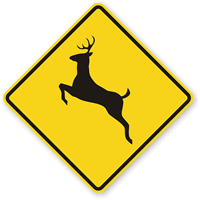
Steering Clear of Wildlife
America’s roads are full of cars — but often, they’re also full of wildlife. That’s why an estimated 2 million vehicle-animal collisions happen each year, according to the U.S. Department of Agriculture.
Fall and winter constitute the most dangerous periods for these incidents. Visibility is reduced, thanks to the shorter days and inclement weather, and it’s also migration and mating season for many animals. But, you can still take steps to decrease the chances you’ll hit an animal. Here are five things to do:
- Be particularly alert at dawn and dusk. Visibility is low at these times, and animal activity is high.
- Keep an eye out for signs. If you’re in an area where wildlife is common, you may see posted warnings.
- Watch your speed. Avoiding any kind of collision is easier if you’re travelling at an appropriate rate of speed. And, it’s not just about the speed limit. In certain conditions, driving under the speed limit is more optimal.
- See an animal? Look for more. Missing one animal doesn’t mean you’re out of the woods, so to speak. There are probably others around.
- Don’t swerve. If possible, don’t make any wild maneuvers. You could end up hitting something worse than an animal — like another car — or going into a ditch or down an embankment. Use your brakes, use your horn, and use your good judgment.
Sometimes, though, collisions just can’t be avoided. If you do hit an animal, here’s what to do next:
- Call 911 for assistance, especially if there are injuries to you or passengers.
- Don’t touch the animal. They can be dangerous, even when hurt.
- Document the accident scene and the damage to your car.
- Get in touch with your insurance carrier or with us.
Keep in mind that the same attributes that make for safe everyday driving can also help you avoid animal collisions: Remain alert, maintain a safe speed for conditions and avoid distractions. Also, be sure to carry adequate car insurance in case something – animal-related or otherwise – does happen.
